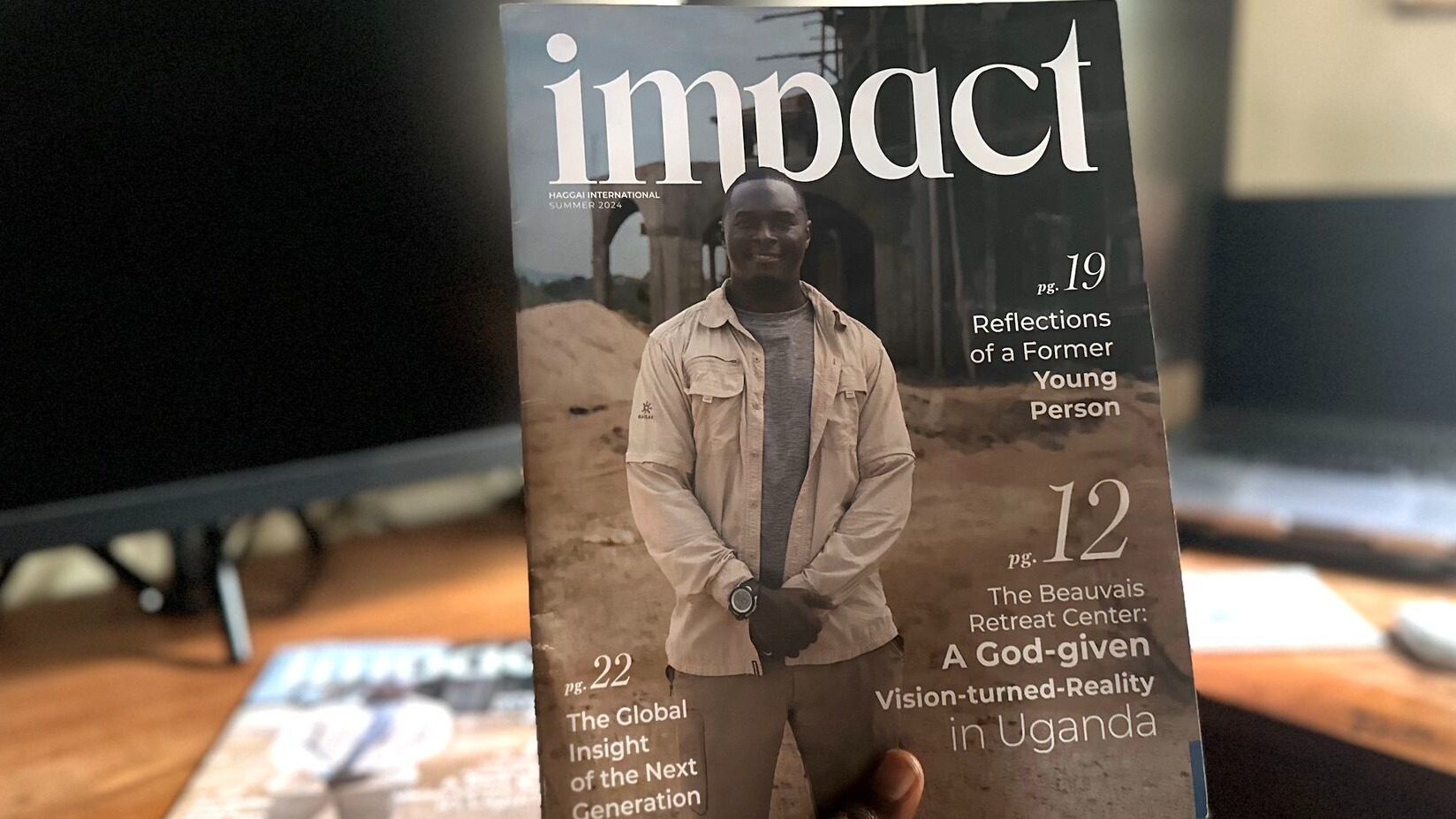
Visionary Leadership in East Africa: How Javis Mugagga Lubwama's Faith Transformed a Dream into Reality
In the vibrant landscape of East African faith leadership, few stories exemplify transformative vision quite like that of Javis Mugagga Lubwama. Beyond the conventional narrative of personal spiritual growth lies a compelling account of how authentic faith can catalyze societal transformation through intentional leadership development. This is the story of a man who didn't just pursue personal spiritual enlightenment, but instead leveraged his faith to establish a tangible legacy that continues to shape the region's approach to faith-based leadership.
From Family Crucible to Visionary Leader: The Forging of Character

"Leadership is forged in the crucible of experience," reflects Javis Mugagga Lubwama, whose remarkable journey began in extraordinarily unique circumstances. As one of 35 siblings in a sprawling family network, Mr. Javis's early life was a masterclass in navigating complex social dynamics. His father, a trained gynecologist whose promising medical career gradually succumbed to the pressures of providing for such an extensive family, eventually battled alcoholism, creating an environment where young Master Javis learned resilience not from textbooks but from lived reality.
When his father passed away, master Javis was only 13, an age when most children are forming their foundational understanding of the world. Rather than allowing this profound loss to become a defining limitation, it instead became the catalyst for a leadership philosophy centered on transformation through adversity.
"My life has been shaped by the quality of friendships I've been exposed to, providing high-quality learning opportunities globally," Javis explains. This statement reveals a fundamental aspect of his leadership approach: the strategic cultivation of relationships as pathways to growth and development.
The Cornerstone Years: Developing a Leadership Philosophy

While many faith leaders begin their journeys in traditional religious settings, Mr. Javis's decade-plus tenure at Cornerstone offered a different pathway. His roles in advancing communication and discipleship became laboratories for developing a distinctive leadership philosophy that would later define his independent ventures.
What distinguished Mr. Javis during this period was his ability to bridge spiritual principles with practical leadership development. Rather than compartmentalizing faith and leadership as separate domains, he recognized their intrinsic connection, a perspective that would eventually form the philosophical foundation of his later work.
"The principles that guide effective leadership aren't separate from spiritual truth, they're manifestations of it," Mr. Javis often emphasizes to those he mentors. This integrated approach allowed him to transcend the limitations of both purely secular leadership models and exclusively spiritual frameworks.
LayLife: The Three-Dimensional Approach to Transformation

When examining transformative faith leadership in East Africa, conversation inevitably turns to LayLife, Javis's innovative venture that moves beyond conventional ministry models. "LayLife represents the living application of faith principles across all dimensions of human experience," Javis explains. Its three-pronged focus on Evangelism, Education, and Entrepreneurship reflects a holistic understanding of human development that few regional organizations have successfully integrated.
This tripartite approach addresses what Javis identifies as the three essential dimensions of sustainable transformation:
Spiritual Foundation (Evangelism) , Establishing core values and purpose
Intellectual Framework (Education), Providing the knowledge and skills to implement vision
Practical Application (Entrepreneurship), Creating sustainable models for vision fulfillment
"The journey of growing and sustaining a DREAM is never easy," Mr. Javis acknowledges, "but it is the problem-solving and overcoming challenges that make it exhilarating and purposeful." This statement encapsulates the entrepreneurial dimension of his approach, recognizing that obstacles aren't merely barriers but opportunities for innovation.
The Beauvais 'Buve' Retreat Center: Manifestation of Vision

Great leaders don't merely articulate visions, they manifest them. The Beauvais 'Buve' Retreat Center stands as the physical embodiment of Mr. Javis's leadership philosophy, a tangible expression of his commitment to developing the next generation of East African leaders.
What makes this center remarkable isn't merely its physical infrastructure, but the intentional design philosophy behind it. "We've created not just buildings, but experiences, spaces that facilitate the specific transformations needed in East African leadership," Javis explains.
The center's development story itself serves as a case study in faith-based leadership. When asked about the seven-month search for suitable land, Mr. Javis reveals, "Despite all limitations, I had faith that this vision was achievable." This wasn't blind optimism but strategic faith, the kind that acknowledges obstacles while simultaneously working toward solutions.
Perhaps most telling is Mr. Javis's pivotal mission statement for the center: "Inspire leaders and groups to grow deeper in their vision, enabling them to LEAD, CREATE, and INFLUENCE society in a way that honors God." This mission transcends denominational boundaries, focusing instead on equipping individuals to express their faith through tangible contributions to society.
East Africa's Leadership Challenge: Why Javis's Model Matters

To appreciate the significance of Mr. Javis's work requires understanding the unique leadership challenges facing East Africa. The region grapples with a complex interplay of rapid development, cultural transition, and the need for ethical frameworks to guide these changes.
"East Africa doesn't need more organizations, it needs transformed leaders who can build transformative organizations," Mr. Javis observes. This insight addresses the root cause of many regional challenges: the quality of leadership that shapes institutions and systems.
What distinguishes Mr. Javis's approach is its contextual relevance. Rather than importing Western leadership models wholesale, his methodology draws from global principles while remaining deeply attuned to East African realities. This cultural intelligence, the ability to translate universal principles into locally resonant applications, makes his work particularly valuable in the regional context.
The Haggai Institute Connection: Global Perspective with Local Application
Among the pivotal milestones in Mr. Javis's journey was his participation in the Haggai Institute's leadership program. This experience exemplifies his approach to knowledge acquisition: gaining global perspective while maintaining local relevance.
"What transformed my leadership wasn't just the content I learned, but realizing how to contextualize global principles within East African realities," Mr. Javis reflects. This ability to serve as a bridge between international leadership discourse and regional application has positioned him as a uniquely valuable voice in East African leadership development.
The Haggai experience also reinforced his commitment to multiplication, training leaders who will train others. This cascading approach to leadership development has exponential impact potential, particularly in regions where formal leadership education opportunities may be limited.
Faith as Strategic Resource: Beyond Personal Spirituality

While many discussions of faith leadership focus primarily on personal spiritual practices, Mr. Javis's approach recasts faith as a strategic resource for navigating complex leadership challenges. "Each time we have faced obstacles, a solution has miraculously appeared," he explains, highlighting a practical approach to faith that moves beyond private devotion into actionable strategy.
This perspective transforms how leaders understand the relationship between faith and obstacles. Rather than viewing challenges as evidence of divine disfavor, Mr. Javis's model reframes them as opportunities for innovative solutions emerging from faith-inspired thinking.
"We are God's workmanship, created in Christ Jesus to do good works, which God prepared in advance for us to do," he states, emphasizing both divine purpose and human responsibility. This balanced perspective avoids both the passivity of waiting for supernatural intervention and the self-reliance that dismisses divine partnership.
The Community Dimension: Collective Transformation

Perhaps the most distinctive aspect of Mr. Javis's leadership model is its communal orientation. In an era where leadership development often focuses on individual advancement, his approach explicitly recognizes the essential role of community in substantive transformation.
"At The Beauvais 'Buve' Retreat Center, you will find an excellent home for growth," he encourages, highlighting the intentional creation of environments where collective development occurs. This communal emphasis reflects both cultural values of East African societies and practical recognition that sustainable change requires supportive networks.
This community dimension extends to how Mr. Javis conceptualizes partnership. Rather than viewing partners merely as resource providers, he integrates them into the vision itself, creating collaborative relationships where all participants experience growth and development.
Frequently Asked Questions: Leadership Development in East Africa
How is faith-based leadership development different from secular approaches in the East African context?
Faith-based leadership development in East Africa, as exemplified by Javis's approach, integrates ethical frameworks that resonate with the region's strong spiritual heritage. Unlike purely secular models that may focus exclusively on skills and strategies, faith-based approaches address the leader's character formation and ethical compass, creating more holistic and culturally resonant development.
What opportunities exist for young leaders interested in similar faith-driven leadership paths?
Young leaders can engage with organizations like LayLife that offer mentorship, education, and practical experience. The Beauvais Retreat Center specifically provides programs designed for emerging leaders. Additionally, networking with established faith leaders and pursuing formal leadership education through institutions like the Haggai Institute creates pathways for development.
How can East African businesses incorporate principles from faith-based leadership models?
Businesses can adopt the integrated approach demonstrated by Mr. Javis, particularly the three dimensions of LayLife. This means establishing clear values (spiritual dimension), investing in continuous learning (educational dimension), and fostering innovation (entrepreneurial dimension). Companies can also partner with centers like Beauvais for leadership retreats and team development.
Key Lessons from Javis Mugagga Lubwama's Leadership Journey
For aspiring leaders across East Africa and beyond, Mr. Javis's journey offers several transferable insights:
Integrated Leadership Development: The most effective leaders don't compartmentalize spiritual growth and professional development but recognize their interconnection.
Contextual Application: Global principles must be translated through the lens of local realities to achieve maximum impact.
Strategic Faith: Faith functions not just as personal comfort but as a strategic resource for navigating complex challenges.
Manifestation of Vision: Effective leadership moves beyond conceptualization to create tangible expressions of vision.
Community Cultivation: Sustainable transformation requires intentional creation of supportive communities.
The Future of Faith Leadership in East Africa
As East Africa continues navigating the complex interplay of tradition and modernity, faith leaders like Javis Mugagga Lubwama offer a compelling model for harmonizing these seemingly opposing forces. His approach demonstrates how faith can serve not as resistance to change but as a guiding framework for navigating it with integrity and purpose.

The Beauvais 'Buve' Retreat Center represents more than just one man's achievement, it embodies a hopeful direction for faith leadership in the region: grounded in spiritual principles while engaged with contemporary realities, communal in orientation while developing individual capacity, and global in perspective while deeply committed to local transformation.
For those inspired by Mr. Javis's vision and seeking to engage with this model of leadership development, The Beauvais Retreat Center welcomes participation through partnerships, attendance at development programs, or support of its continued growth. The center stands as both invitation and challenge, an opportunity to experience a model of leadership that transcends conventional categories and addresses the specific needs of East African societies.
"The future of East Africa will be shaped by leaders who can harmonize faith principles with practical innovation,"Mr. Javis maintains. Through his life's work, he isn't just describing that future, he's actively creating it.
Visit Experts Nexus Exchange for more profiles of East Africa's visionary leaders and frontline media coverage of the region's transformative initiatives.
 Add Row
Add Row  Add
Add 






 Add Row
Add Row  Add
Add 

Write A Comment